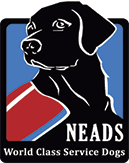NEADS Service Dogs for Veterans with PTSD Program
The Trauma Assistance Dog program (TAD) is designed for veterans with diagnosed service-related PTSD from trauma that occurred during active duty.
Program requirements include regular travel to NEADS campus in Princeton, MA for the first year of the program. Applicants must live within a 3-hour drive of the NEADS campus.
We are not currently accepting applications for the NEADS TAD Program.
If you feel that you meet the initial criteria for the TAD program listed below, we ask that you check this page periodically for updates on the application process. You can also research other programs through the following website: www.assistancedogsinternational.org.
Initial criteria for the TAD program include:
- In individual therapy at least 2 times a month for the past 6 months with a licensed mental health provider
- At least 12 months sober if in sobriety
- No recent major life changes that include, a new marriage; a new child; a new pet; a major move; change in jobs, etc. We ask that you have 12 months’ time of stability after a major life change
- If you have had a recent suicide attempt, we ask that you be 12 months from the attempt before applying
- Can manage any anger management-related challenges
- Live within a 3-hour drive of Princeton, MA
How does a NEADS Service Dog help a veteran with PTSD?
What tasks does a NEADS Service Dog perform to help a veteran with PTSD?
Here are three examples:
What to look for in a Service Dogs for Veterans with PTSD Program
NEADS is one of the first Service Dog organizations to develop a program for veterans with PTSD. Our program was developed in conjunction with Walter Reed National Military Medical Center and leading experts in trauma. As a charter member of ADI (Assistance Dog International), NEADS is recognized as an approved Service Dog program by the VA.
This checklist highlight the key features of a successful Service Dogs for Veterans with PTSD program.
